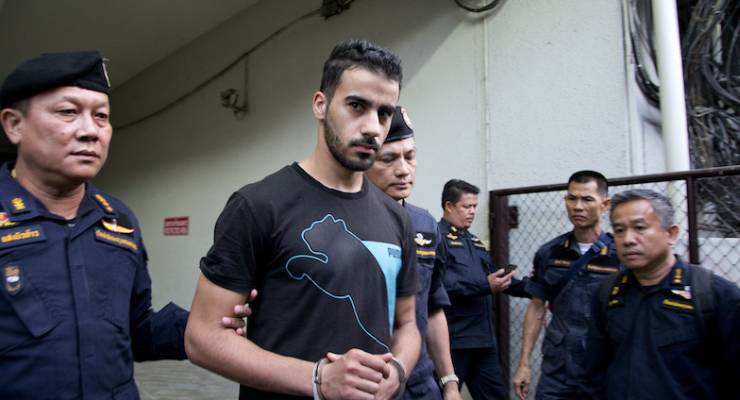
Over the last 10 days, the media has scrambled to get any answer of depth to the questions that have arisen after the arrest of Hakeem Al-Araibi. Al-Araibi is a Bahraini semi-professional soccer player who was granted refugee status in Australia last year. He was arrested when entering Thailand for a holiday with his wife, despite receiving approval for the trip from the Australian government.
It seems no government department comms teams will explain why the refugee was subject to the Interpol red notice, and lawyers in Australia and overseas say the act contravenes Interpol’s own regulations. The act of issuing red notices against refugees on behalf of the country they fled from (in Al-Araibi’s case, Bahrain) is banned.
The only question I actually submitted last week to five different government comms teams was simply: “which arm of government is responsible for informing Interpol that Australia has granted someone refugee status?”
I avoided asking any question that the respective government or media teams could say was unanswerable due to Al-Araibi’s privacy. I wanted to know (and still do) what his arrest means for other refugees who have been granted asylum by Australia.
Asylum Seeker Resource Centre lawyer Carolyn Graydon told me her team was concerned that other refugees granted protection by Australia might now be questioning their safety when they travel overseas.
“I would urge the government to confirm, both to refugees and publicly that it does have procedures in place to ensure that Interpol is routinely made aware when a grant of protection is made,” she said.
Other lawyers I asked hazarded that the Attorney-General’s Department or Home Affairs may be the office that alerts Interpol when someone has refugee status, but no one could or would answer my single question, which did not contravene anyone’s privacy. (The AG’s office, the Department of Foreign Affairs and Trade, and the Australian Federal Police replied promptly to my requests, but Home Affairs did not reply once other than to ask who I was writing for).
Multiple deadlines came and went over the last week with nothing substantial, until yesterday morning, when Australian Federal Police sent this via email:
The below response on behalf of the agencies within department, which can be attributed to the Department of Home Affairs:
The Interpol National Central Bureau in Australia advised Thai authorities in relation to the scheduled arrival of a person who was the subject of an Interpol Red Notice.
Any action taken in response to the Interpol Red Notice is a matter for Thai authorities.
Any further questions on this matter are a matter for Thai authorities.
Oh dear.
Interpol Australia alerted Thai authorities that Al-Araibi was on his way, but did not at any point warn him. Sources say the Bahrain government lodged the red flag notice with Interpol on November 8 — the very same day Al-Araibi was given a visa to travel to Thailand for his holiday.
How very, very embarrassing for Australia and potentially life-changing for Hakeem Al-Araibi. He is still at risk of being returned to Bahrain — a country in which he has said he was persecuted and tortured, and a country that Australia accepted he was at great risk from when it granted him refugee status here last year.
And I still have one single unanswered question: whose bloody job was it to tell Interpol that Australia had granted Al-Araibi refugee status so he was protected from any misuse of the Interpol red flag system?
I do not expect that is a question the Thai authorities can answer.








The Australian Federal Police appears to be a rogue agency, going on their tipping off of Indonesia regarding the Bali-9, and now this with their admission that they’d informed the Thai authorities regarding the Interpol Red Notice.
It’s a act of commission, instead of the slightly lesser act of omission.
How come this guy can be granted protection so quickly and yet others have been on Manus and Nauru for over 5 years?
Is it because he entered Oz on a plane…or because he plays some kind of football?????
What has that got to do with the story?
Thank you for pursuing this Rebekah. It is a valid question that needs to be answered properly. I can not help but feel that some Australian authority or authorities are unaware of their responsibilities, and have not been taking the steps that they should be.
So much for the whole idea of putting all the law ‘n’ order agencies under one dept and one Secretary. Anything heard from Peter Dutton, who is the Lawnorder Czar in Australia, or his Home Affairs Secretary Pezzullo?
I’ll be looking forward to Jack Waterford’s column in Saturday’s Canberra Times. He regularly calls out the AFP for being a mob of plods on any number of issues but this one represents peak idiocy.
Meanwhile, the Michaelia Cash enquiry? Who leaked the Wilkie ONA paper to Bolt in 2003? Any number of other issues as well. No wonder Morrison doesn’t want his new Corruption and Integrity mob to look at anything retrospectively, which made me wonder why none of the journos asked about the pink batts RC or the Shorten Royal Commission. Both were retrospective.
You have to hand it to the Liberals – when it comes to shameless hypocrisy and immunity from embarrassment, they are global leaders.
Apart from tipping off Indonesia about the Bali 9, the AFP over the last 20yrs has routinely tipped off Thailand, Singapore & Malaysia about drug mules, supposedly because it ensures that we get the hot goss & co-operation from them – rather like relying on Saudi to help against jihadi terrorism.
Most of the AFP/Customs officers who happily shopped Oz mules to death penalty regimes did so “because they only get a slap on the wrist here”.
Just the sort of attitude we need in Home Affair – also very prevalent amongst the spook brigade as well.